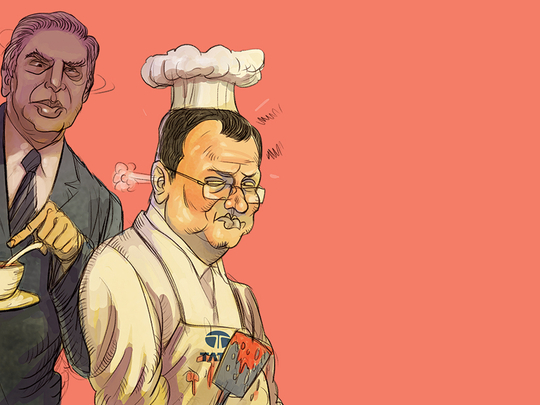
A Facebook post aptly described the ongoing Tata Group spat: Mother-in-law Ratan Tata announced that he would go on a pilgrimage and anointed daughter-in-law Cyrus Mistry. But Ratan could not give up his worldly desires and kept a watch on what’s cooking in the Tata Empire.
He could not digest the fact that Cyrus was running the kitchen on his own, deciding which curry to make for lunch and dinner. So Ratan began playing games. Now he has come back and deposed Cyrus. He has taken charge of the kitchen and says he is looking for a new daughter-in-law.
As an investor in stock markets, my view about the sacking of the chairman of the $108 billion (Dh396.7 billion) group is beyond the mother-in-law/daughter-in-law feud. I would rather give thumbs up to wealth creation, hands-on management, profits, healthy margins, regular dividend payouts, and, above all, vote for a chairman that doesn’t get carried away by personal emotions or hangers-on.
Mistry was trying to fix all of the above issues that have for long been plaguing India’s largest corporate house that has 29 companies listed on the stock exchanges out of a total of 100 operating companies. The investor wholeheartedly supports him and can vouch for what he was doing — clean up the mess created by his predecessor and bring the Tata Group back into the game.
However, Ratan has nudged Mistry out and in doing so, it’s back to square one for the Tata Group. An investor can say authoritatively that under his stewardship shareholders haven’t made decent returns on their investments in Tata Motors, Tata Steel, Tata Consultancy Services, Indian Hotels, Tata Power, when compared with other large cap stocks.
Culturally, we believe in respecting elders. So the general mood is to repose their faith in the septuagenarian Ratan rather than the 48-year old Mistry. Financially speaking, Indians are willing to forego profits or dividends for Ratan.
And Indians have long forgotten what Ratan delivered in his first four years, but want to point fingers at Mistry over not doing enough in as many years. We have a very humane approach towards the 660,800 employees of the Tata Group who were being evaluated by Mistry on strict performance parameters and many would have lost their cushy jobs for the shoddy quality of products in the Nano.
We want to feign ignorance to a foreign acquisition strategy that left a large debt overhang. And problems such as the group’s European steel business facing potential impairments in excess of $10 billion, or that many foreign properties of Indian Hotels and holdings in Orient Hotels have been sold at a loss, or that Tata Chemicals still needs tough decisions about its UK and Kenya operations pale in comparison to the soft feelings for Ratan.
It doesn’t matter that Indian Hotels had to write down nearly its entire networth over the past three years, impairing its ability to pay dividends.
Who cares that Tata Capital has a book that requires significant clean up due to non-performing assetss on account of bad loans to the infrastructure sector. The telecom business has been continuously haemorrhaging so much so that if the group were to exit this business via a fire sale or shut down, the cost would be $4 billion plus.
This is in addition to any payout to DoCoMo of at least $1 billion plus.
Indians would rather liken the recklessness of Ratan to vision. The foray into the aviation sector or the Tata Nano car priced under $2,000 or the buyout of Corus Steel are all considered to be part of the great vision of Ratan Tata.
According to Mistry, the fact is that there are legacy hotspots such as Indian Hotels, Tata Motors PV, Tata Steel Europe, Tata Power Mundra, and Teleservices wherein capital employed in these companies has risen from Rs1.32 trillion to Rs1,960 billion (Dh72.5 billion to Dh107.7 billion) — due to operational losses, interest and capital expenditure.
This figure is higher than the networth of the group, which is at Rs1.74 trillion. A realistic assessment of the fair value of these businesses could potentially result in a write-down over time of about Rs1.18 trillion.
The conduct of Ratan had come under fire in the 2G telecom scam and in reality that particular episode blew the lid off the Tata Group. Imagine the then chairman investing in a company that supplies the gliders for the Nano car made by Tata Motors. A clear case of conflict.
But now that he is back, claims and counter claims are being dished out to media by both sides and for the investors, this season is going to be full of real-life sparks.
The writer is Director, Brandmark Group.












